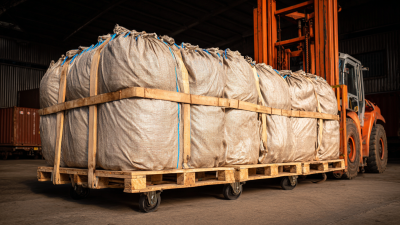
Choosing the right materials for your business is crucial for ensuring efficiency, durability, and cost-effectiveness. One material that has gained significant traction across various industries is the HDPE sheet. Renowned for its high-density polyethylene composition, this versatile product offers a myriad of benefits, including excellent chemical resistance, high impact strength, and lightweight properties. Whether you're in manufacturing, construction, or packaging, selecting the best HDPE sheet tailored to your specific needs can profoundly affect your operations.

In this blog, we will explore essential considerations for choosing the ideal HDPE sheet for your business, factoring in aspects such as thickness, color, surface finish, and compliance with industry standards. By understanding these elements, you can make informed decisions that enhance your product quality and overall performance.
Choosing the right HDPE sheet for your business requires a clear understanding of the various types available for industrial use. HDPE, or high-density polyethylene, is known for its durability, chemical resistance, and versatility, making it an ideal choice for numerous applications. The market for HDPE sheets is closely tied to the growing HDPE pipes market, projected to reach USD 25.68 billion by 2029. This significant growth reflects the increasing investments in infrastructure and the demand for sustainable materials across various industries.
When selecting HDPE sheets, consider the specific properties each type offers. For instance, sheets with higher molecular weight provide greater strength, while those with enhanced UV resistance are perfect for outdoor applications. It's also essential to stay informed about the environmental impact of plastic use. The excessive production and disposal of plastics have led to increasing concerns about plastic pollution, urging industries to explore more sustainable solutions, including the potential for bioplastics as alternatives. The projected growth of the HDPE sheets market is thus not only driven by demand but also by the need for environmentally responsible choices.

When selecting the best HDPE sheets for your business needs, it's crucial to understand the key factors that can influence your decision. One of the primary considerations is the type of HDPE you need, such as high-density or linear low-density polyethylene. Each type offers different characteristics, especially in terms of strength, flexibility, and resistance to environmental stress. Businesses that require durable and rigid materials should lean towards HDPE, while those needing flexibility might consider alternatives like LLDPE.
Another vital factor is the end-use application of the HDPE sheets. Industries such as packaging, automotive, and construction have specific requirements that dictate the thickness, color, and UV resistance of the sheets. It’s essential to evaluate how the sheet's properties will affect its performance in your specific application, particularly in high-stress environments.
Tips: Always request samples before making a bulk purchase to ensure the material meets your specifications. Additionally, consider the environmental impact of your choice; sourcing sheets made from recycled HDPE can not only be more sustainable but also align with your company's green initiatives. Lastly, leverage supplier expertise; collaborating with knowledgeable vendors can provide insights that help you make informed decisions tailored to your business needs.
When selecting the best HDPE sheet for your business, understanding the relationship between thickness and density is crucial. Thickness, measured in millimeters or inches, plays a significant role in the sheet’s durability and application suitability. Thicker sheets generally offer enhanced strength and better resistance to impact, making them ideal for heavy-duty applications such as construction and manufacturing. Conversely, thinner sheets may suffice for lighter uses, such as packaging or liners, where flexibility and ease of handling are more important than sheer strength.
Density, measured in grams per cubic centimeter (g/cm³), further influences the material properties of HDPE sheets. Higher density sheets tend to possess greater resistance to chemicals, UV radiation, and environmental stress, making them suitable for outdoor applications. It's also important to consider the end-use; for instance, a high-density sheet might be preferable for specialized tasks like food processing or water containment, while lower density sheets may be adequate for everyday items. By balancing these factors, businesses can ensure they select an HDPE sheet that meets their specific operational needs effectively.
When selecting the ideal HDPE sheet for your business needs, it’s essential to evaluate its performance characteristics based on specific applications. HDPE sheets are known for their durability, resistance to impact, and ability to withstand various environmental conditions. For instance, if you're in the food processing industry, opting for a sheet that meets FDA regulations is paramount. This ensures safety and hygiene while allowing for maximum performance in conveying or displaying products.
Moreover, considering factors such as UV resistance, temperature tolerance, and chemical compatibility can significantly influence the longevity and functionality of the HDPE sheets in your operations. For applications exposed to sunlight, like outdoor signage or containers, selecting UV-stabilized HDPE is critical to prevent degradation. Similarly, if your operations involve harsh chemicals, choosing a type with excellent chemical resistance is necessary to avoid failures that could lead to costly downtime. By carefully assessing these performance attributes, your business can optimize the use of HDPE sheets for various applications, ensuring efficient and reliable operations.
| Application | Thickness (mm) | Density (g/cm³) | Impact Strength (kg·cm/cm²) | Chemical Resistance | UV Resistance |
|---|---|---|---|---|---|
| Food Packaging | 2-5 | 0.95 | 30 | Excellent | Good |
| Industrial Tanks | 5-10 | 0.96 | 50 | Very Good | Moderate |
| Construction | 10-20 | 0.97 | 50 | Good | Excellent |
| Agricultural Use | 5-15 | 0.95 | 45 | Excellent | Good |
| Marine Applications | 12-25 | 0.94 | 55 | Very Good | Excellent |
 When considering the procurement of
HDPE sheets for your business,
cost-effectiveness is paramount. Budgeting for HDPE sheet procurement involves not only the initial
purchase price but also the long-term usage costs that can significantly impact your bottom line. A detailed
analysis of your project requirements, including the thickness,
size, and specific applications of the sheets, will help you make informed
decisions that align with your financial goals.
When considering the procurement of
HDPE sheets for your business,
cost-effectiveness is paramount. Budgeting for HDPE sheet procurement involves not only the initial
purchase price but also the long-term usage costs that can significantly impact your bottom line. A detailed
analysis of your project requirements, including the thickness,
size, and specific applications of the sheets, will help you make informed
decisions that align with your financial goals.
Recent insights from industry reports indicate that setting up manufacturing plants for HDPE products entails considerable investment, especially in 2025. Understanding the setup costs, raw material requirements, and potential operating expenses is crucial. By evaluating these factors, businesses can budget more accurately, allowing for smarter investment in HDPE sheets. Additionally, considering alternative sources for your materials or collaborative purchasing strategies with other businesses can further enhance cost-effectiveness, ensuring you maximize the value of your procurement efforts.












